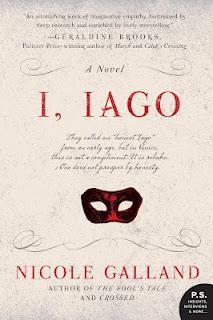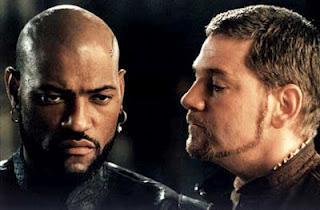I, Iago
by Nicole Galland

Published: April 24th, 2012
Publisher: William Morrow Format: E-Book
Pages: 400
Cover Art
I genuinely adore this cover. It is something that would definitely catch my eye in a bookshop. The font, the mask, the swirly quote: it feels so Venetian and antiquey. The quote reads, 'They called me 'honest Iago' from an early age, but in Venice that is not a compliment. It is rebuke. One does not prosper by honesty.'
Plot Synopsis
From earliest childhood, the precocious boy called Iago had inconvenient tendencies toward honesty—a failing that made him an embarrassment to his family and an outcast in the corrupt culture of glittering Renaissance Venice. Embracing military life as an antidote to the frippery of Venetian society, Iago won the love of the beautiful Emilia and the regard of Venice's revered General Othello. After years of abuse and rejection, Iago was poised to achieve everything he had ever fought for and dreamed of . . .
But a cascade of unexpected deceptions propels him on a catastrophic quest for righteous vengeance, contorting his moral compass until he has betrayed his closest friends and family, and sealed his own fate as one of the most notorious villains of all time.
Inspired by William Shakespeare's classic tragedy Othello—a timeless tale of friendship and treachery, love and jealousy—Galland's I, Iago sheds fascinating new light on a complex soul, and on the conditions and fateful events that helped to create a monster.
My Rating:

First Line:
'' They called me 'honest Iago' from an early age, but in Venice that is not a compliment. It is rebuke. One does not prosper by honesty. "
This is a solid three-starrer; in other words, it is average and good enough but it didn't excite me. Highs: The second half of the novel definitely picks up and was where all the action really happened! As Iago started to become increasingly warped and twisted I started to become increasingly interested! Lows: The first 100 pages or so are quite tough going and the romance brings about some seriously cringe worthy quotes.Pocket-Size Review
Review This book didn't set my world on fire but it was a decent enough read. The first half really dragged for me, but the second half really perked up my interest and I was addicted for the last 150 pages. If you can keep focused until the end it is a rather enjoyable book but that is only if you can make it that far.
I did feel rather intellectual reading a Shakespeare re-telling, which, by the way is exactly what it is. It is a re-telling of Shakespeare's 'Othello' from the point of view of the antagonist Iago. Iago is probably Shakespeare's most renowned villain and rightly so. Even though Othello is the character the book is named after, Iago actually has more lines in the play (1037!) than Othello himself. He is cruel, scheming and incredibly jealous. Scholars have debated furiously throughout the years over Iago's motivations for being such a purely evil character, as he is presented in 'Othello'. Some, such as Samuel Taylor Coleridge, believe that Iago possesses "motiveless malignity" , meaning that he wreaks havoc on the other characters' lives for no ulterior purpose. However, Andy Serkis (Gollum in LOTR), who portrayed Iago in a more recent performance, paints a different representation of Iago which is much closer to the one Nicole Galland paints in this novel. Serkis says,
There are a million theories to Iago's motivations, but I believed that Iago was once a good soldier, a great man's man to have around, a bit of a laugh, who feels betrayed, gets jealous of his friend, wants to mess it up for him, enjoys causing him pain, makes a choice to channel all his creative energy into the destruction of this human being, and becomes completely addicted to the power he wields over him. I didn't want to play him as initially malevolent. He's not the Devil. He's you or me feeling jealous and not being able to control our feelings.This is very much how Galland presents Iago in this novel. She begins his story at childhood, where he strives for approval from his father and is frustrated when his obvious genius goes to waste. He never lies, and his honesty and bluntness is famous in Venice. So how does he get to the point where barely a word out of his mouth is not a lie? Where he would plot his friend's murder? It is his resentment and the power he realises his intelligence and gift with words can produce. The control he has over those more powerful than him becomes addictive, and warps him until he can justify even the most evil acts of cruelty. You do sympathise with him for the majority of the novel, as he does appear overlooked and wronger and those around him seem silly and vain and naive. Cassio is presented as a foppish womaniser and Othello is weak and overly trusting. We never really discover why Othello chooses Cassio rather than Iago to be his Lieutenant, and I felt Iago's disappointment as keenly as he did; he had been Othellos 'right hand' for many. many years and built up his trust. Cassio comes on the scene and he is basically a sneaky go-between for Othello and Desdemona to communicate their love letters. I think the resentment I felt towards the characters is testament to Nicole Galland's writing, as Iago is often cited as a force of Machiavellian evil, yet I found he actually justified his actions pretty well! I am clearly very easily swayed! I also found his silence at the end very telling and his love for his wife is, at times, touching.

I also felt that this novel brought up some interesting questions about Othello's conduct. Hearing it from Iago's point of view, who remains logical and rational even at the height of his scheming, it casts a new light on who should share the blame. Othello believes and trusts Iago effortlessly, and believes his wife is flirting with other men and even sleeping with them, with no proof whatsoever. He is driven mad in less than a day by his jealousy, and even punches Desdemona in front of his men. The fact he has no proof yet still launches on her so easily when he claims to love her so much is proof he must be slightly deranged. This novel hints at the edge of insanity Othello possesses and that, although Iago antagonises Othello, he never actually uses anything other than words to defame Desdemona. Words can be powerful, but really? You couldn't just sit down and have a rational conversation with your wife and sort things out? Sorry to sound all marriage counselor but that probably would've been a better option than blindly following the word of a man you obviously didn't trust enough to make your lieutenant. In a way, I find all of Shakesperare's tragedies irritating for the way the characters blindly work themselves up and do something incredibly stupid ONE MOMENT before it all could've been saved. Annoying.
Although I found the romance between Iago and his wife Emilia sweet at times, there were some incrdibly icky and cringe-worthy quotes that I could not brush aside. If a man ever said this to be, I would probably slap him,
Emilia says: 'My parents lack imagination and humour, so they do not value those qualities in me. They would like to find somebody to whom I may be useful, but they can't quite figure out what I'd be useful for.'
Iago: I was brazen: I eyed her slender, curving body up and down with undisguised desire. "I can think of something you'd be very useful for"
Emilia: To my great relief, she merely chuckled and crossed her arms over her chest.'Ugh. Call me prudish, but that is just icky. And, might I add, this is said on THEIR FIRST MEETING. Ogh. Iago I am ashamed of you. Despite these icky moments, I genuinely liked Emilia, to the point where I felt I wanted to know what was going on insde her head as well. I'm thinking a dual narrative might have worked here in places as Emilia was a central character yet we lost her towards the end as Iago kept her at arm's length. It would be pretty cool to have a woman's opinion on the events and find out what she and Desdemona spoke of as they slumped over their embroidery!
This novel is good for brushing up on your Shakespeare; the character names remain unchanged and I know I will remember these characters better for reading it than I did reading the original! It is nice to feel you have that bit more Shakespeare knowledge under your belt! I think this would be an interesting novel for Othello fans, as it does bring up some interesting questions of blame and the characters individual motivations. However, Iago isn't presented as evilly as I wished, and it just lacked SOMETHING; some sparkle and some creativity. I wanted Venice more glittering, Iago more twisted and Desdemona more exquisite. What I got felt somewhat flat and just didn't deliver.
Other Thoughts This Book has Inspired me to Read: To be honest, this book didn't really inspire me to read any of the authors other novels, or other Shakespeare re-tellings. If I had the inclination and time, I would love to read more Shakespeare but I am looking for lighter reads this summer!
Memorable Quote:
'Listening to his tales of whoring was like listening to a description of a thunderstorm by a person who is both blind and deaf, but who happened to be standing outside and therefore got wet somehow.'
Three Words to Describe this Book: Venetian, Intriguing, Average.
But Don't Take My Word For It:- Blog Reviews of 'I, Iago':
Life in Review says: 'I very highly recommend this book! It is exquisitely written. The characters are so vivid and the author’s twist on the story will make you feel different about characters that you already know from classic literature.'
The Picky Girl says: ''I, Iago is incredibly well written and researched, and Galland gives Iago the life, personality, and motivation he seems to lack in Othello'
- Reviews in the News:

